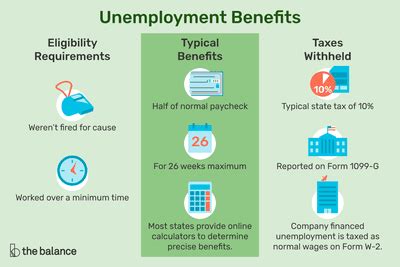Part-Time Employment And Unemployment Benefits: What You Should Know

Part-time employment is becoming increasingly popular in today’s job market. Many people are opting for part-time work for various reasons, such as raising children, pursuing education, or seeking a better work-life balance. However, part-time employees often have questions about their rights and benefits, especially when it comes to unemployment. In this article, we’ll discuss everything you need to know about part-time employment and unemployment benefits.
Understanding Part-Time Employment
Part-time employment refers to a type of job where an employee works fewer hours than a full-time employee. The number of hours may vary depending on the company and the industry, but typically, part-time employees work less than 35 hours per week. Part-time employees are entitled to certain rights and benefits, but they may not have access to the same benefits as full-time employees.
Advantages of Part-Time Employment
There are several advantages of part-time employment, including:
- Flexible work schedule
- Opportunity to pursue other interests or education
- Better work-life balance
- Less stress and pressure compared to full-time work
Disadvantages of Part-Time Employment
There are also some disadvantages of part-time employment, such as:
- Limited access to benefits
- Lower pay compared to full-time work
- Less job security
- Less opportunity for career advancement
Unemployment Benefits for Part-Time Employees
Unemployment benefits are designed to help workers who have lost their jobs due to no fault of their own. Part-time employees who have lost their jobs may be eligible for unemployment benefits, but the rules and regulations may vary depending on the state and the company. Here are some things to keep in mind:
Eligibility for Unemployment Benefits
To be eligible for unemployment benefits, a part-time employee must meet the following criteria:
- Must have lost their job due to no fault of their own
- Must have worked a certain number of hours and earned a certain amount of wages during the base period (usually the last 12 months)
- Must be actively seeking new employment
- Must be able and available to work
Calculating Unemployment Benefits
The amount of unemployment benefits a part-time employee can receive depends on several factors, such as:
Duration of Unemployment Benefits
The duration of unemployment benefits for part-time employees also varies depending on the state and the company. In general, most states provide up to 26 weeks of benefits, but some states may offer extended benefits in certain circumstances.
Conclusion
Part-time employment can be a great option for those who need flexibility or want to pursue other interests. However, part-time employees should be aware of their rights and benefits, especially when it comes to unemployment. By understanding the rules and regulations, part-time employees can make informed decisions and protect their financial well-being.
FAQs
1. Can part-time employees receive unemployment benefits?
Yes, part-time employees may be eligible for unemployment benefits if they meet certain criteria, such as losing their job due to no fault of their own and actively seeking new employment.
2. How are unemployment benefits calculated for part-time employees?
The amount of unemployment benefits a part-time employee can receive depends on several factors, such as the state where they live and work, their earnings during the base period, and their average weekly wage.
3. How long can part-time employees receive unemployment benefits?
The duration of unemployment benefits for part-time employees varies depending on the state and the company. In general, most states provide up to 26 weeks of benefits, but some states may offer extended benefits in certain circumstances.
4. What are the advantages of part-time employment?
Some advantages of part-time employment include a flexible work schedule, the opportunity to pursue other interests or education, better work-life balance, and less stress and pressure compared to full-time work.
5. What are the disadvantages of part-time employment?
Some disadvantages of part-time employment include limited access to benefits, lower pay compared to full-time work, less job security, and less opportunity for career advancement.
